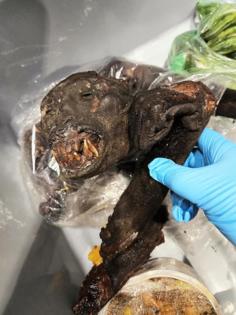Primate, rodent meat seized at Detroit Metro Airport, officials say
Published in News & Features
DETROIT — U.S. Customs and Border Protection said its officers at Detroit Metro Airport seized potentially disease-ridden wild animal meat twice in one week last month.
Officials said on the first occasion, agents found 11 pounds of rodent meat from the west African country of Togo when they examined a passenger's baggage. Days later, in the second incident, they found 52 pounds of primate meat declared as antelope in the baggage of a traveler from the central African nation of Gabon, according to authorities.
Meat from such wild animals is known as bushmeat. Customs and Border Protection officials said bushmeat, which usually comes from non-human primates and cane rats in certain regions of the world. They said it is considered a delicacy in parts of Africa and often consumed raw or subject to minimal processing, which increases the risk of disease, such as Ebola or mpox.
Because diseases from bushmeat can have catastrophic consequences if they enter the human population, it is illegal to import it into the U.S.
Agents confiscated the bushmeat and turned it over to the Centers for Disease Control and Prevention for disposal.
They said both travelers also had other undeclared agricultural items with them. Officers fined each of them $300 for those undeclared items, the agency said.
"These recent bushmeat interceptions are significant in bringing attention to the illegal importation of bushmeat through our ports of entry," Port Director Fadia Pastilong said in a statement. “This also showcases how we work with our partner agencies to prevent a potential disease outbreak."
Officials said agents sporadically find rodent bushmeat at the airport and intercepting primate meat is much rarer.
"We routinely find various agriculture items and oddities — live giant snails, animal skulls, and exotic food items —but most times it’s not a malicious act," Marty Raybon, director of Customs and Border Protection's Field Operations in Detroit. "Despite this, it’s our duty to protect the homeland, and preventing certain food and animal products from entering the U.S. is essential to public health."
Last month, customs agents said they intercepted cherries infested with European cherry fruit flies at Detroit Metro.
Also in July, officers said they seized a live Egyptian locust from a traveler at the airport in March.
The month before that, officers said they confiscated an inert hand grenade from a passenger at the airport.
-------------
©2025 www.detroitnews.com. Visit at detroitnews.com. Distributed by Tribune Content Agency, LLC.







Comments